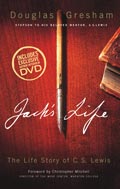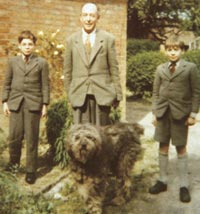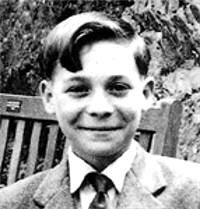We all know C. S. Lewis as the great thinker, apologist, and the creative genius behind such beloved works as Mere Christianity and the Chronicles of Narnia—including The Lion, The Witch and The Wardrobe, a feature film coming to theaters on December 9. But Douglas Gresham, stepson to the famous author, knows Lewis much better than that, calling him “the finest man and the best Christian I’ve ever known.”

Gresham was born in New York City in 1945. His parents divorced when Douglas was young, and his mother, Joy, later struck up a pen-pal friendship with Lewis. The friendship deepened, and Joy and her sons, Douglas and David, moved to England in 1953. Three years later, Joy and Jack—as Lewis was known to his friends—were married, and Lewis ultimately adopted the boys. But it wasn’t long before Joy was diagnosed with cancer, and in 1961, just five years into their marriage, Joy died. Douglas was 15.
Today, Gresham, who turns 60 in November, is a busy man. He’s serving as a producer/consultant on the new Narnia movie, and he’s just written a new book, Jack’s Life (Broadman & Holman), about his stepfather. In addition to his duties promoting the movie and his book, Gresham is in high demand for interviews and speaking engagements. He recently spent part of an afternoon with Christianity Today Movies, where we had a wide-ranging interview about his life with Lewis and his insight into the movie.
We had such a rich and lengthy conversation with Gresham that we’ve split it into two parts. Today, part one, focuses on Gresham’s relationship with Lewis, and tomorrow, part two, will focus on the new movie.
It’s been a busy time for you these last few months, promoting the film and your new book. Just how wild of a ride has it been?
Douglas Gresham: It started five years ago when we started negotiating to make this movie, and of course everything starts to accelerate toward release date, getting more and more frantic. Now we’re simply weeks away from releasing the movie, and still working frantically to get everything finished, get everything polished, have everything perfect. But right now, I’m feeling a little bit like a yo-yo on a short string. I’m bouncing backwards and forwards all over the place. So, yeah, it is a wild ride.
Is that a good thing?
Gresham: It’s a great thing. I thrive on it. The whole experience of making this movie, working with the team, it’s been wonderful. And of course it’s the realization of a lifelong dream, an ambition I’ve had since I was a child. My kids tell me that they remember me talking, dreaming, scheming and thinking about making this movie all their lives, since as early as they can remember. So the more I put into it, the happier I’ll be.
 |
Let’s talk about your new book. You’ve noted that many of the biographies about Lewis have been about Jack the thinker and not Jack the man. Does that mean you’re irritated with those old bios?
Gresham: No, I’m not exactly irritated with them. There is a place for an analytical, critical biography of C. S. Lewis. But most of them are written by people who never met him, never knew him. And quite frankly, a lot of what they say is just nonsense. I don’t think we need 30 critical and analytical biographies of C. S. Lewis and his works. So I decided that if I wanted to actually buy a book about somebody, I would want to know their life story. I would want to know who they were and what happened to them. So if nobody else was going to write it, I thought I’d better write it myself.
What were you trying to accomplish with Jack’s Life?
Gresham: What I’ve tried to do is to start the book at a relatively young reading age and build it through the course of the book until at the end, people are reading at a much higher reading age. I hope the book appeals not only to children or young people, but to adults of all ages. If you want to know about C. S. Lewis’s life, why he was called Jack, what happened to him in his life, what kind of man he was, this is the book. If you want to indulge in a critical, analytical analysis of C. S. Lewis the scholar, C. S. Lewis the theologian, or C. S. Lewis the writer, don’t come to me because I won’t give it to you.
Which book delivers best on that front?
Gresham: I think probably the George Sayer one and the Walter Hooper one.

You’ve said, “Jack was the finest man and the best Christian I’ve ever known.” Why do you feel that way?
Gresham: Jack was a man who was always available, and I think this is the crux of Christianity. We all tend to read complex Christian books analyzing the Scriptures, analyzing the various doctrines. And all that does is complicate the issues. God sent down all his rules and regulations; they were ignored. He sent the prophets; they were ignored. Jesus came down himself to tell us how to live real human lives, and he was ignored. Since then, scholars have written critical and analytical things about the Scriptures. But C. S. Lewis wrote in his books, This is how to do what Jesus taught. His message is, “Stop talking about it, stop studying it, just get out there and do Christianity.” Jack did it.
How? Tell me what that looked like.
Gresham: A guy approached Jack on the street one day and asked him if he could spare a few shillings. And Jack immediately dove into his pocket and brought out all his change and handed it over to this beggar. And the chap he was with—I think it was Tolkien—said, “Jack, you shouldn’t have given that fellow all that money, he’ll just spend it on drink.” Jack said, “Well if I had kept it, I would have only spent it on drink.”
Jack would give to anyone who asked him. He was sufficiently conscious of the need for good stewardship to be a little careful in some areas, but if he found out that someone was in need, he would give. He was a man who had been brought up to fear going into poverty. All his life he had this almost pathological fear of penury, and yet he gave away about two-thirds of his earnings.
At the end of the movie Shadowlands, there’s a scene that makes everybody weep, the scene with Jack and you in the attic, crying together over your mother’s death. Is that scene pretty accurate?
Gresham: Yep. It was very distinct. When Bill Nicholson was writing it, he had no idea that anything like that had ever happened. It actually did happen—in the common room, not the attic. I was writing Lenten Lands at the same time. We swapped manuscripts and I was staggered to see that Bill had written that as a fictional occurrence and he was staggered to see that it really happened.
Many of us have read A Grief Observed, but what can you tell me about observing Jack’s grief after your mom died?
Gresham: Well, Jack was observing it from inside. I was only observing it from outside. He was, for the most part, pretty stoic, pretty strong. But if someone started to talk about my mother, he would weep. For an English school boy—I was 14 at the time—nothing more embarrassing could possibly happen than to be caught crying in public. But when he wept, I would. Which is why in A Grief Observed he says he can’t talk about our mother to us, because we acted as if he had said something obscene. But it wasn’t because we felt anything of that nature at all. It was because we knew he’d burst into tears if he did talk about her.

But Jack mostly kept his grief to himself. There’s an extraordinary story of Donald Swann, who was writing a libretto for an opera about one of Jack’s books. He had an appointment to visit Jack, and when he arrived, it was one of those beautiful summer days in England. Jack said, “Let’s chat about this while we walk around the garden.” So they started discussing the libretto and whatever else they were discussing, and when they were done, Jack said, “Well, you’ll have to excuse me now. You see, my wife died last night.” And blinded by tears, he stumbled in to the house.
The man’s courage was superb. He could fulfill this obligation because he committed to it, despite the fact that he was being destroyed by the grief from his wife’s death the night before. An amazing man. Most of the time he kept his grief in check. But sometimes I’d come into a room and I would see Jack just completely bereft, weeping his heart out, and I would just back silently away and leave him to it.
Tell me one thing you wrote about in this new book that’s never been revealed before about Jack.
Gresham: One of the things Jack never told anyone but me about was his experiences in the First World War, and some of that comes out in this book. People don’t understand that the First World War was a conflict unique in the history of warfare, because the men journeyed to the battlefield and lived there, staying in the trenches, living up to their necks in mud formed with the earth mixed with the blood of their former comrades, with rats as big cats and lice everywhere. People just don’t understand what that was like. They stayed there and they lived there for weeks, months and years, if they lived that long. That didn’t happen in the Second World War. The first really brutal Hollywood depiction of the Second World War was probably Saving Private Ryan. But that was utterly tame compared to what was going on in the First World War.
In the foreword to your book, Chris Mitchell writes that “some readers will feel that the author has drawn an overly pious picture of Lewis. But one must remember that our author believes that Lewis, indeed, was a saint, and a saint of the most real kind, not someone without flaws but rather one who aspired to overcome those flaws and in fact did so in many cases.” What were Jack’s flaws, and which ones did he overcome and which ones did he take to his grave?
Gresham: Jack was very conscious of his own conceit. And of course, in humor, my mother would often rub it in too. But I think he overcame that enormously because he always came across as the most humble of men. And Jack was, at times, impatient and intolerant. But he overcame that also because no one would ever have known if they didn’t live with him. He was never impatient or intolerant with me, but I could see he was struggling on occasions not to be.
Jack was also enormously conscious of his own almost incredible intellectual gifts. And I think when he was an atheist, he was very proud of those gifts. But when he committed his life to Christ, he realized that our intellect is given to us by God. So I think he overcame that too. I don’t really know of any major vice that Jack took to his grave.
What is the least understood or least recognized aspect of Jack’s character?
Gresham: His humor. Everybody sort of pictures Jack as this dour professor, isolated in the ivory towers of academia of Oxford. But in fact he was this enormous bon vivant. He could tell great stories. On the drive coming out to Oxford, taking Jack back after a weekend or a holiday, I’d go along for the ride. We’d stop somewhere at a pub for a pork pie and a pint, and within minutes, Jack would have the public bar surrounded by builders, workmen, plumbers, electricians, bricklayers, roaring with laughter and enjoying every story he was telling them. And he would be laughing with them, conversing as equals with them. Nobody ever sees this in modern depictions of Jack. People would say, “Who’s the guvnor? He’s a real gent, isn’t he?” That was Jack.
Were these true stories he was telling, exaggerations, or what?
Gresham: Sometimes he’d just be telling jokes. And he wasn’t averse to ribald joke, as long as it was funny for itself and not simply for its obscenity. But if he would come up with a joke that was both ribald and funny for its own sake, he would use it.
Americans have latched on to C. S. Lewis, and yet here’s a guy who was a chain smoker, who liked his pints, who told ribald jokes, and in general, wouldn’t fit what we think of as the “typical evangelical.” And yet we’ve all wrapped our arms around him. Why is that?
Gresham: One of the reasons is that through the—if you can excuse the expression—the bulls— that has come to be taken so seriously in American Christianity, through all of that, they can still see the essential truth that Jack represented. The problem with evangelical Christianity in America today, a large majority of you have sacrificed the essential for the sake of the trivial. You concentrate on the trivialities—not smoking, not drinking, not using bad language, not dressing inappropriately in church, and so on. Jesus doesn’t give two hoots for that sort of bulls—. If you go out and DO Christianity, you can smoke if you want, you can drink if you want—though not to excess, in either case.
But I think that even past the trivialities, many evangelical Christians can see the ultimate truth to what Jack wrote. I think that’s why he’s so popular.
Movie images copyright © 2005 Disney Enterprises, Inc. and Walden Media, LLC. All rights reserved.
Copyright © 2005 Christianity Today. Click for reprint information.











